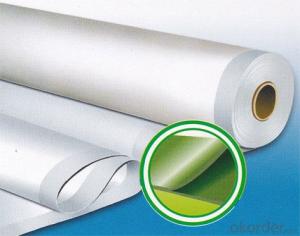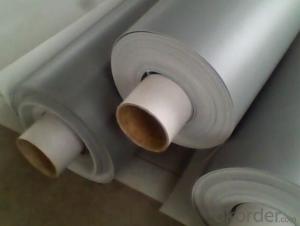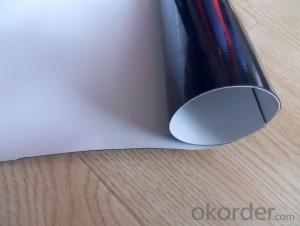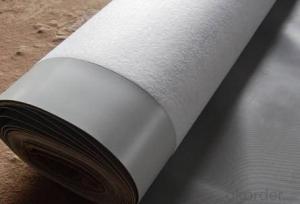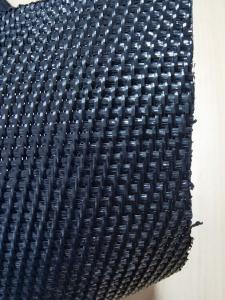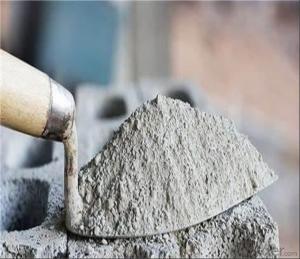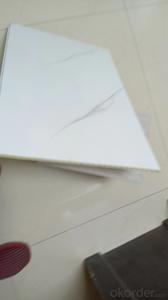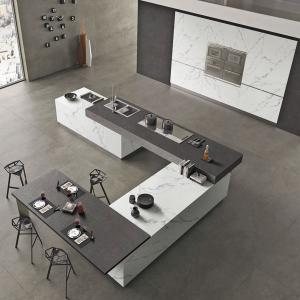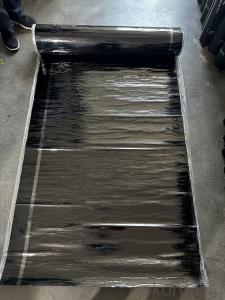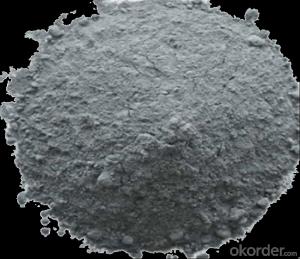PVC Waterproofing Sheet in Polyester Reinforcement with Custom Thickness
- Loading Port:
- Shanghai
- Payment Terms:
- TT OR LC
- Min Order Qty:
- 20000 m²
- Supply Capability:
- 5000000 m²/month
OKorder Service Pledge
OKorder Financial Service
You Might Also Like
PVC Waterproofing Sheet in Polyester Reinforcement with Custom Thickness
Product Description of PVC Waterproofing Sheet in Polyester Reinforcement with Custom Thickness:
PVC Membrane Waterproof /Waterproofing membrane For Roof is a new polymer waterproof membrane. The PVC Membrane Waterproof /Waterproofing membrane For Roof raw material is polyvinyl chloride resin, mixed with plasticizer, filler, antioxygen, ultraviolet absorber and other auxiliaries.
Thickness: 1.2mm/1.5mm/1.8mm/2.0mm
Width:2050mm
Length:20m( Special specifications can be customized)
Size: 2.05mx20m
Color: white/grey, or any other colors.
Features of PVC Waterproofing Sheet in Polyester Reinforcement with Custom Thickness:
1. Excellent anti-aging property.
2. Puncture- resistant.
3. Welding construction,
4. High tensile strength, good elongation, good dimensional stability.
5. Good plasticity.
6. It has self-extinguishing from fire property.
7. Materials surface is smooth, fast color, stain resistance.
8. More wide, Wastage become less when being used.
Classification of PVC Waterproofing Sheet in Polyester Reinforcement with Custom Thickness:
1. N: Homogeneous PVC membrane
2. L: PVC membrane with fabric backing
3. W: Reinforced PVC membrane
Advantage of PVC Waterproofing Sheet in Polyester Reinforcement with Custom Thickness:
1.) Mixing automation. Apply automatic temperature control automatic time control and automatic feed control.
2.) Extrusion equipment uses twin screw coextrusion. Screw temperature uses computer automatic temperature control system.
3.) Handpiece uses large width didhead extrusion equipment.
4.) Sophisticated three-roller calender equipment. The space between equiment is controlled by automation system.
Technical Data of PVC Waterproofing Sheet in Polyester Reinforcement with Custom Thickness:
No. | Item | Model Ⅱ | |
1 | Tensile Strength Mpa ≥ | 12.0 | |
2 | Elongation at break% ≥ | 250 | |
3 | Shrinkage rate % ≤ | 2.0 | |
4 | Flexibility at low temperature | No crackle at -25oC | |
5 | Water tightness | Watertight | |
6 | Puncture resistance | Watertight | |
7 | Heat aging treatment | Appearance | Free from bubble, crack, cohesion and void |
Change rate of tensile strength % | +20oC | ||
Change rate of elongation at break | |||
Flexibility at low temperature | No crack at -20oC | ||
8 | Chemical corrosion resistance | Change rate of tensile strength % | +20 |
Change rate of elongation at break | |||
Flexibility at low temperature | No crack at -20oC | ||
9 | Artificial weathering | Change rate of tensile strength % | +20 |
Change rate of elongation at break | |||
Flexibility at low temperature | No crack at -20oC | ||
Application of PVC Waterproofing Sheet in Polyester Reinforcement with Custom Thickness:
1) All kinds of roofs, such as steel structure roof, planted roof etc.
2) Underground engineering, such as building basement, subways, tunnels, air raid shelter, etc.
3) Other projects like artificial lake, dam, water reservoir, grain storehouse, etc.
Images of PVC Waterproofing Sheet in Polyester Reinforcement with Custom Thickness:
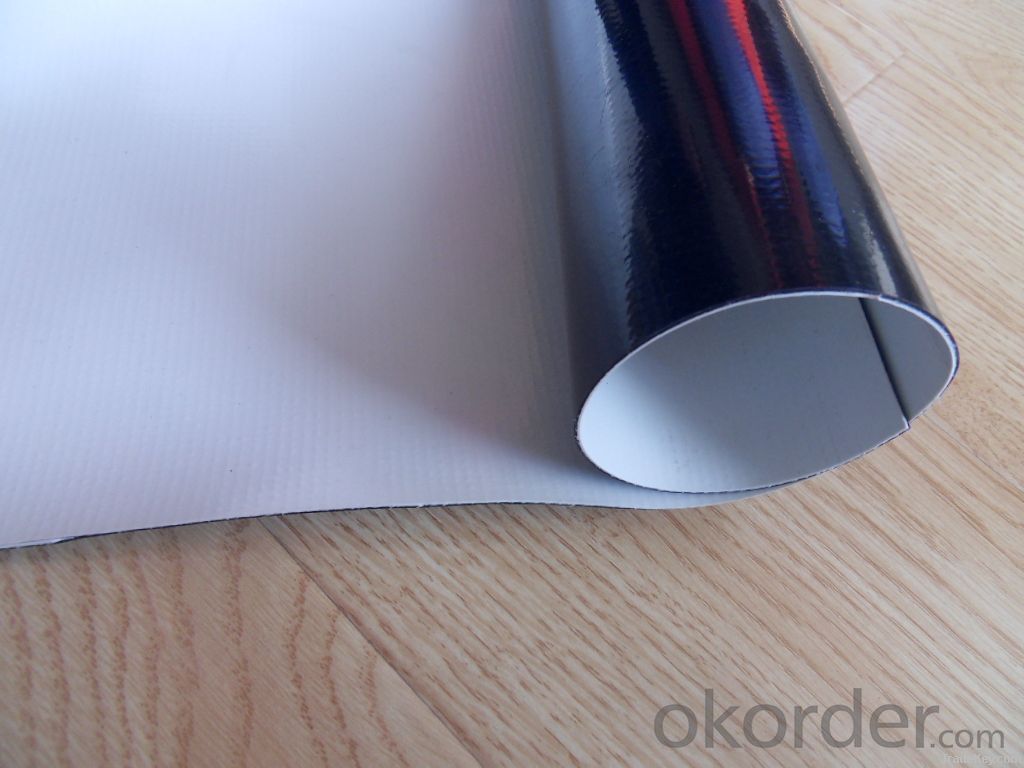
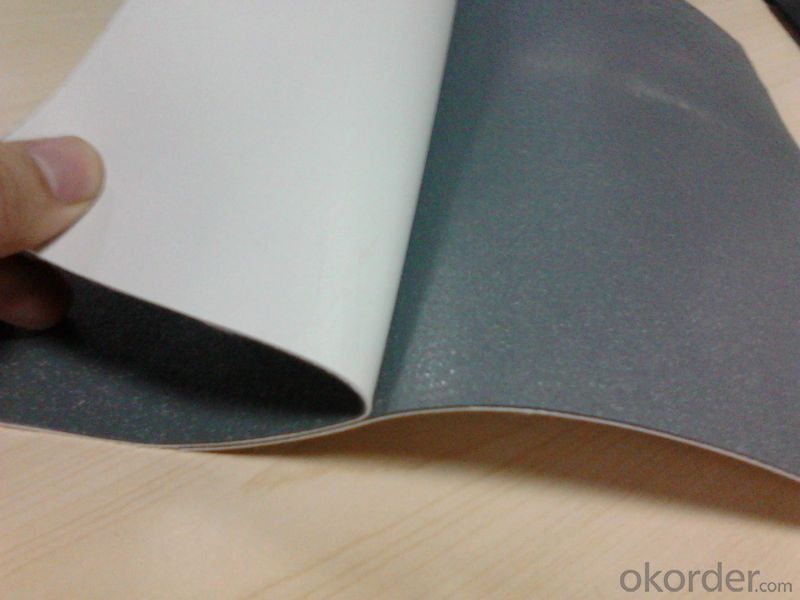
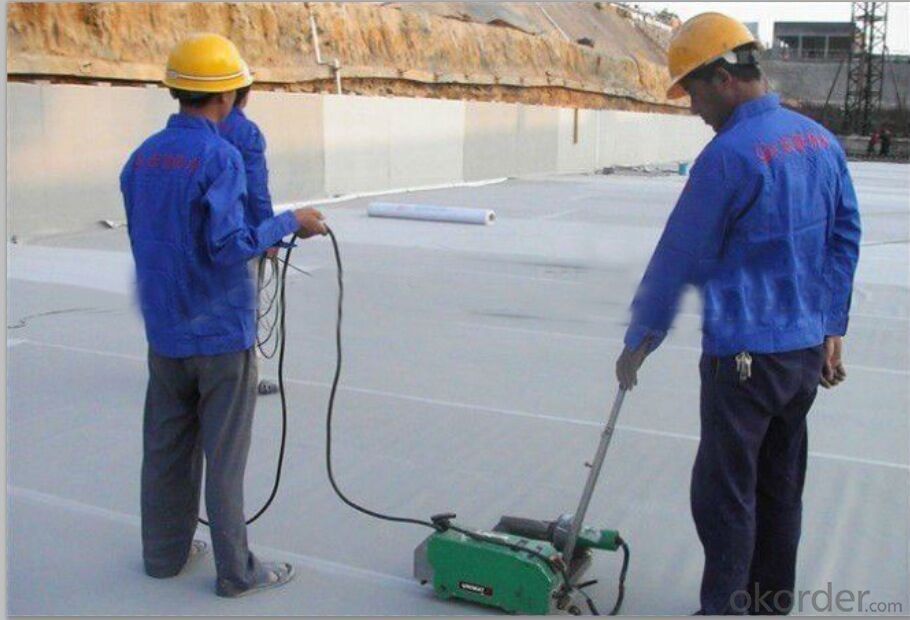
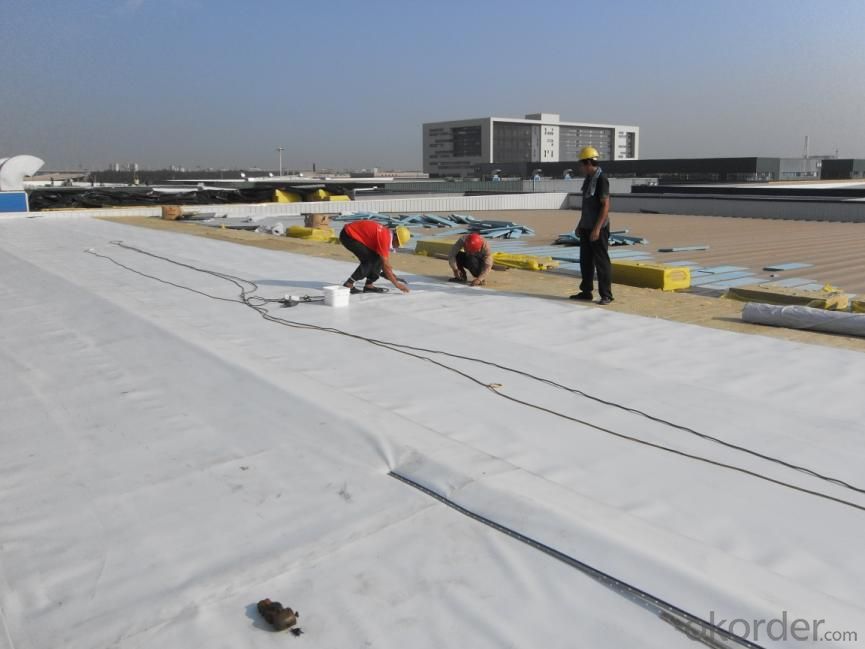
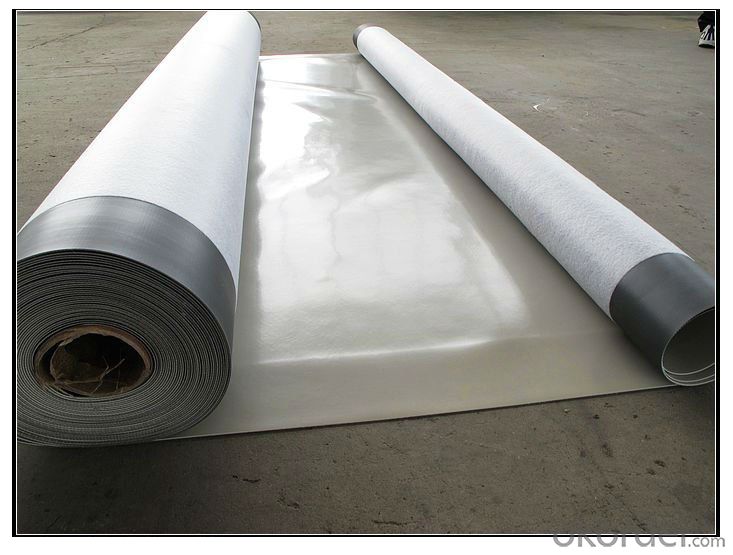
FAQ:
1. Can you produce 4m width?
Yes, no problem for us. We have four bases in China, largest one in this field.
2. How many quantity in one 20'' container for 1.2mm and 1.5mm?
480rolls, 11520m2 for 1.2mm and 400rolls, 9600m2 for 1.5mm
3. Can you provide free samples?
Yes, our samples are free, but express fees usually on buyer's account.
- Q:Are waterproofing membranes suitable for bridge abutments?
- Bridge abutments, the structures supporting the ends of a bridge, can benefit from the use of waterproofing membranes. Given their exposure to moisture and water, it is crucial to protect these structures. Waterproofing membranes serve as an effective barrier against water and moisture intrusion, making them an excellent solution for bridge abutments. These membranes, typically composed of materials like bitumen, PVC, or EPDM, possess high resistance to water penetration. Moreover, they offer additional protection against factors such as UV rays, chemicals, and temperature changes. By installing waterproofing membranes on bridge abutments, the risk of water damage, deterioration, and corrosion can be significantly reduced. Consequently, the bridge structure's durability and longevity are enhanced.
- Q:Can a waterproofing membrane be walked on?
- Walking on a waterproofing membrane is possible, but it depends on the type of membrane and its intended use. Some waterproofing membranes, like those used in roofing, are designed to withstand foot traffic without damage. These membranes are durable and can be walked on during installation and maintenance. However, it is crucial to follow the manufacturer's guidelines to ensure the membrane remains intact and provides effective waterproofing. On the other hand, certain types of below-grade waterproofing membranes may not be suitable for walking on as it could compromise their performance. It is advisable to consult a professional or refer to the manufacturer's instructions to determine if walking on a specific waterproofing membrane is safe and appropriate.
- Q:Can waterproofing membranes be used on both horizontal and vertical surfaces?
- Yes, waterproofing membranes can be used on both horizontal and vertical surfaces. Waterproofing membranes are designed to provide a barrier against water penetration and can be applied on various surfaces, including roofs, walls, floors, and even underground structures. They are versatile in their application and can be used to protect both horizontal surfaces such as flat roofs or balconies, as well as vertical surfaces like walls or foundations. The flexibility and durability of waterproofing membranes make them suitable for a wide range of construction projects, ensuring that water does not seep through and cause damage to the structure.
- Q:Can a waterproofing membrane be used for plant rooms?
- Yes, a waterproofing membrane can be used for plant rooms. Plant rooms often house machinery and equipment that require protection from water and moisture. Using a waterproofing membrane can help prevent water damage to the plant room and the equipment inside. It creates a protective barrier that keeps water from penetrating the walls, floors, and ceilings of the plant room. This can be especially important in areas where there is a higher risk of water leaks or condensation. Waterproofing membranes are designed to withstand various environmental conditions and can provide long-lasting protection for plant rooms.
- Q:Can a waterproofing membrane be used for food processing facilities?
- Yes, a waterproofing membrane can be used for food processing facilities. Waterproofing membranes are commonly used in various industries, including food processing, to ensure protection against water penetration and moisture damage. In food processing facilities, where hygiene and cleanliness are of utmost importance, waterproofing membranes can be applied to floors, walls, and ceilings to prevent water or other liquids from seeping into the building structure. Waterproofing membranes create a protective barrier that effectively seals the surfaces, preventing the growth of mold, mildew, and bacteria that can contaminate food products. They also help in maintaining a clean and dry environment, reducing the risk of slips, falls, and accidents caused by wet surfaces. Food processing facilities often deal with water-intensive processes such as cleaning, washing, and sanitizing, making it crucial to have a reliable waterproofing system in place. Additionally, waterproofing membranes can offer resistance to chemicals, oils, and other substances commonly used in food processing, ensuring long-term durability and protection. It is important to note that when selecting a waterproofing membrane for a food processing facility, it is necessary to choose a product that complies with industry standards and regulations. The membrane should be food-grade and certified safe for contact with food products to avoid any potential contamination risks. Overall, using a waterproofing membrane in food processing facilities can help maintain hygienic conditions, protect the building structure, and ensure compliance with health and safety regulations.
- Q:Can a waterproofing membrane be installed on curved surfaces?
- Yes, a waterproofing membrane can be installed on curved surfaces. There are various types of waterproofing membranes available in the market that are specifically designed to cater to different surface shapes and conditions. These membranes can be flexible and easily molded to fit curved surfaces, ensuring effective waterproofing even on complex structures. However, it is important to consult with a professional or manufacturer to determine the most suitable membrane and installation technique for your specific curved surface to ensure proper adhesion and long-lasting waterproofing.
- Q:Can a waterproofing membrane be used on lead surfaces?
- Yes, a waterproofing membrane can be used on lead surfaces. Lead surfaces are often found in the roofing industry, and applying a waterproofing membrane can help protect against water damage and leaks. It is important to ensure that the waterproofing membrane is compatible with lead, as some membranes may react with or degrade the lead material. Additionally, proper surface preparation and installation techniques should be followed to ensure a secure and effective waterproofing solution. Consulting with a professional or manufacturer for specific product recommendations and installation guidelines is recommended.
- Q:Can a waterproofing membrane be applied on curved surfaces?
- Indeed, curved surfaces can indeed be coated with a waterproofing membrane. In reality, waterproofing membranes are designed to possess flexibility and adaptability, which render them suitable for usage on a variety of shapes and contours, including curved surfaces. These membranes are typically constructed from materials like modified bitumen, polyurethane, or rubber, all of which possess exceptional properties of elongation and flexibility. Thus, they can be easily shaped and stretched to conform to curved surfaces without compromising their waterproofing abilities. Consequently, structures featuring curved components like roofs, balconies, tunnels, and tanks can be effectively waterproofed. However, proper installation techniques and specialized tools may be necessary to ensure appropriate adherence and complete coverage on curved surfaces. Nevertheless, with the appropriate expertise and materials, successful application of waterproofing membranes on curved surfaces can be achieved.
- Q:Can a waterproofing membrane be used on rubber surfaces?
- Yes, a waterproofing membrane can be used on rubber surfaces. Waterproofing membranes are designed to create a barrier that prevents water from penetrating and damaging the underlying surface. Rubber surfaces, such as roofs, decks, or even rubber flooring, can benefit from the application of a waterproofing membrane to protect them from water damage. The membrane is typically applied as a liquid or a sheet, and it adheres to the rubber surface, forming a protective layer that prevents water from seeping through. This can help to extend the lifespan of the rubber surface and prevent issues such as leaks or decay caused by moisture. However, it is important to ensure that the waterproofing membrane is compatible with rubber and the specific type of rubber surface being treated, as some membranes may not adhere properly or may cause damage to certain types of rubber. It is always recommended to consult with a professional or the manufacturer of the waterproofing membrane to ensure proper application and compatibility.
- Q:Is a waterproofing membrane resistant to gasoline or other petroleum-based substances?
- Yes, a waterproofing membrane is generally resistant to gasoline and other petroleum-based substances.
1. Manufacturer Overview |
|
|---|---|
| Location | |
| Year Established | |
| Annual Output Value | |
| Main Markets | |
| Company Certifications | |
2. Manufacturer Certificates |
|
|---|---|
| a) Certification Name | |
| Range | |
| Reference | |
| Validity Period | |
3. Manufacturer Capability |
|
|---|---|
| a)Trade Capacity | |
| Nearest Port | |
| Export Percentage | |
| No.of Employees in Trade Department | |
| Language Spoken: | |
| b)Factory Information | |
| Factory Size: | |
| No. of Production Lines | |
| Contract Manufacturing | |
| Product Price Range | |
Send your message to us
PVC Waterproofing Sheet in Polyester Reinforcement with Custom Thickness
- Loading Port:
- Shanghai
- Payment Terms:
- TT OR LC
- Min Order Qty:
- 20000 m²
- Supply Capability:
- 5000000 m²/month
OKorder Service Pledge
OKorder Financial Service
Similar products
New products
Hot products
Related keywords
